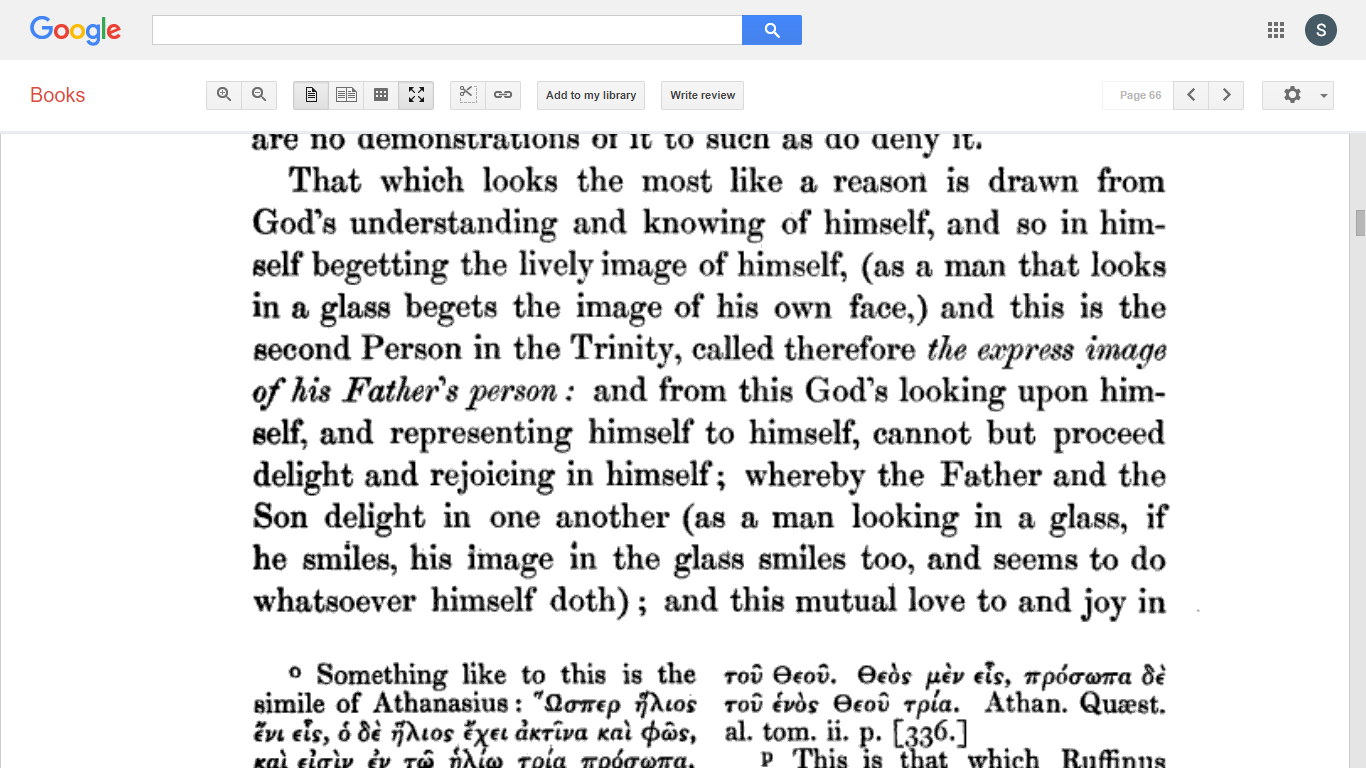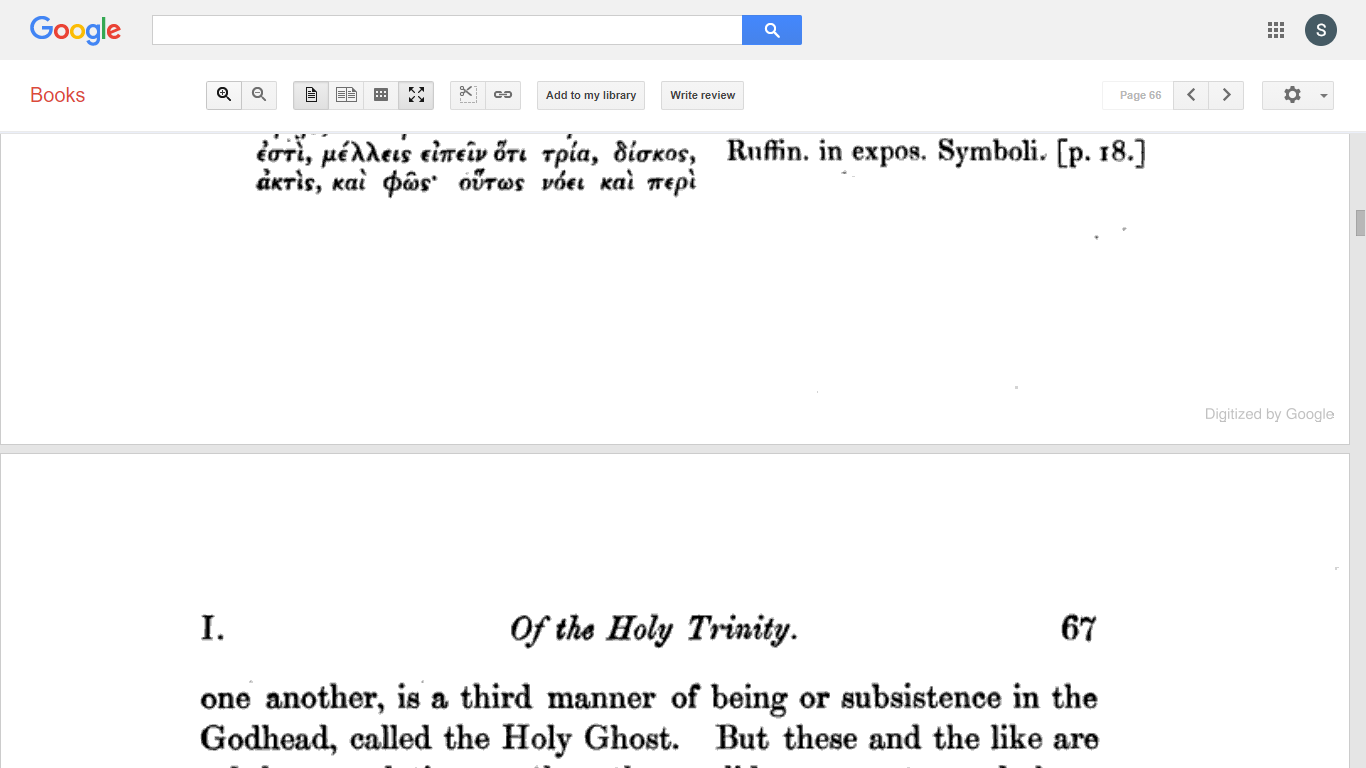Augustine weaves together obtuse psychological concepts to explain a challenging theological concept. I don't know the context as I'm unfamiliar Augustine's works.
The most useful starting point for me is to view both the soul of man and the essence of God as being fundamentally unknowable. There's support in Christian and Jewish scripture for this position.
Can a triune god be extrapolated from Christian and Jewish scripture? Clearly most Christians believe so and the Trinity is a core part of Catholicism. Augustine appears to justify and cement the trinity and if that works for Christians, I can see the value in studying Augustine.
Happy Christmas btw. Nice to see you on the forum. Like you I'm often to busy to post much. Nice post though and well worth the time to consider the question. Uncharacteristically succint of you. What gives?
Thank you Adrian, the Christmas wishes are much appreciated!!
Yes, like yourself in medicine most of my life is taken up at the law firm - but I've also been nursing a very sore foot (
bursa neuroma complex) over the past few months, which has proven very difficult to treat and leaves me with pain walking on it.
On the succinctness, I think brevity is always needful when posing a question on Trinitarian theology. Start with the fundamentals and the formula with the least assumptions, using Occam's razor, then procdeed into the 'quagmire'. Otherwise, folk just get bogged down in masturbatory (self-ingratiating) semantics, with a lot of arcane hifaluting terms bandied around.
Regarding the Trinity in scripture, explicitly I would have to say 'no'. Implicitly, yes.
The Tanakh is a staunchly unitarian-monotheistic redaction (in the Old Testament, there is an incontrovertible statement about YHWH being the sole creator deity (
Isaiah 40-55)) largely, of originally henotheistic materials, with some quasi-proto-hypostatic texts (i.e. the chokhmah or wisdom texts - such as in Proverbs - where the Wisdom of God becomes a personified divine attribute through which God creates the universe, holds it in existence and inspires prophets, or the Angel of the Lord which seems to be a kind of hypostatic theophany or the ruach (Spirit) of God which is seemingly characterised as having quasi-personality and agency not unlike the Maid of Heaven in Baha'i texts (as conduit of divine revelation of God to mankind through Baha'u'llah). We see this emanationist / quasi-hypostatic tendency flower into the later Sefirot of the Zohar in Kabbalistic Judaism.)
By contrast, the New Testament is
binitarian in its conception of God, albeit with a traidic discourse including the Spirit (but the later had no cult of worship in the texts, as later), according to most secular scholars. A dyadic or binatarian cultic devotional pattern centered around the monotheistic worship of one God in two co-eternal, pre-existent divine figures - God the the Father and the Lord Jesus, with the later subsumed into the worship of the former - had become a central plank of nascent Christian belief when Paul wrote his letters, such that he doesn’t even think to expand upon the idea but just endorses it as self-evident.
This binitarian NT theology emerged from an earlier strain of Judaism, which had a 'divine agency' tradition - in which one elevated figure becomes the unique vehicle of the divine presence and is described as an 'elohim' or 'lesser YHWH' assuming the roles normally accorded to God alone, in an eschatological and/or messianic context - which is prominent in a number Second Temple texts and the merkabah mysticism of the next few centuries CE (and which was condemned as heretical and infringing monotheism by the Rabbis of the Babylonian Talmud, who taught unitarianism).
The baptismal creed cited by Paul in 1 Corinthias 8:6 ("
yet for us there is one God, the Father, from whom are all things and for whom we exist, and one Lord, Jesus Christ, through whom are all things and through whom we exist") and the christophanic hymn in
Philippians 2:6-11 ("
who, though he [Jesus] was in the form of God, who did not regard equality with God as something to be exploited, but emptied himself, taking the form of a slave, being born in human likeness") are 'quoted' by Paul as pre-existent traditions that were already known to his audience in the 50s CE (i.e. they needed no elaboration, their truth claims are just presipposed), so scholars such as Hurtado, Ehrman, Bauckham, Fletcher-Louis and Boyarin are convinced that this belief in Jesus's exaltation/glorification to the heavenly realm and corresponding pre-existent divinity, had been taught by the early church soon after Jesus's death.
There is a binitarian formula to all of these early 'visions' and we know from Rabbinic literature in the Talmud that other Jews of this period - including a Rabbi of note, Elisha ben Abuyah (born in Jerusalem sometime before 70 CE) - also had visions of the divine
merkabah (throne) in which they reportedly claimed to see 'two divine figures' (the God of Israel and his 'agent', in ben Abuyah's case 'Metatron', the lesser YHWH seated beside him on a throne) and thus fell into a form of Judaism that other Rabbis regarded as "heretical".
This same binitarian theology is attested in a number of the Dead Sea Scroll texts from Qumran dating from the first century BCE, such as the Melchizedek scroll (11q13) and the Self-Glorification Hymn. These were earlier Jewish sectarians unrelated to the strain/sect that produced the Enochic-Metatron texts. So there seems to have been quite a few of them across a wide geographical spread, with early Christianity being yet another of these 'sects' to have emerged in the Second Temple era (albeit, ultimately, by far the most successful and enduring in the long-term).


